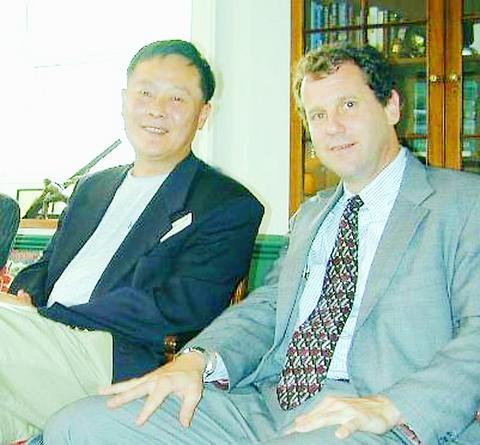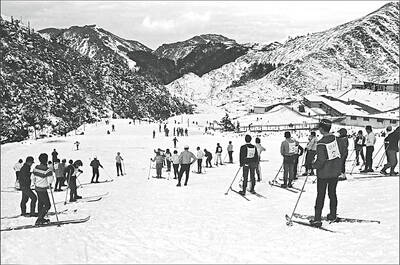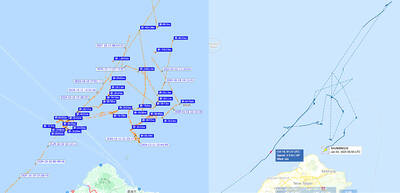Taipei Times: The Congressional Taiwan Caucus is just over one year old. How do you assess the accomplishments of the caucus so far?
Sherrod Brown: The accomplishments are several. One is we have 118 members; that's more than one fourth of the House. It's bipartisan, about half and half. They have coalesced around the WHO [World Health Organization] bill, which we've passed without opposition. They have been active in speaking out on democracy issues and Taiwanese issues. And, the fact that there are four founders, two of each party, allows us to do a lot of things in a versatile way

PHOTO: COURTESY OF SHERROD BROWN
TT: What would you say is the biggest success so far?
Brown: The biggest success is that this caucus has grown faster than any one I've known of on the hill. This was formed only a year ago and has that many members. A caucus like the India Caucus, which was fairly influential, took several years to get to that size. I think that's reason for optimism.
TT: Overall, as you look at Congress as a whole, how would you rate Congress' commitment to supporting Taiwan in its fight for greater recognition internationally and in the US?
Brown: I think that the Congress is supportive to a point. Few Republicans are willing to stand up to President [George W.] Bush, to push him harder on support of Taiwan. Too many members of Congress are cowed by the Chinese government and the Chinese presence. You know, it's a country of a billion plus people, for sure. But it's also a nation that can't hold a candle to the democracy of Taiwan. I'm disappointed that more members of Congress don't stand up to China on human rights. But I also think a lot of members of Congress celebrate the miracle of Taiwan, the democracy of Taiwan and the growing prosperity in Taiwan.
TT: Do you think the caucus stands a chance of turning some of these congressmen around?
Brown: The caucus does matter. In particular, the four founders are the most active. There are other active members, too. But the four of us are speaking for Taiwan and calling on each other when we need assistance on something, and I think the caucus does, over time, really begin to move people into more support for Taiwan. There are more "dear colleague letters" going out, there's more information out there, there's more recognition of Taiwan, there's more attention paid to Taiwan.
TT: You've been the leading congressmen in support of Taiwan's observer status in the World Health Assembly, but you've also been critical of the administration's efforts in the past to push that. How do you think the administration did this year?
Brown: I think the administration did better this year. Every year, through [former president Bill] Clinton and Bush, we've seen a baby step, and this year is no exception. I was hoping, because of SARS, that we would see something more than that. And while I was pleased with what [Health and Human Services] Secretary [Tommy] Thompson did, and I don't want to understate that, I would hope in the future we could see a few giant steps and not just baby steps in terms of assisting Taiwan.
TT: In a statement signing the bill this year, the president seemed annoyed at Congress' demand for a report on the administration's actions, saying he would not disclose certain information. How do you assess that?
Brown: This is an administration that trades in secrecy. It rarely tells the American people or Congress [what] it doesn't want to tell us, what happened Sept. 11; it doesn't much want to tell us what happens in its trade negotiations, and it doesn't really want to report to Congress the moves toward democracy in China, if there are any, and especially doesn't want to share with us its efforts or what it's doing on Taiwan. I don't think it's doing enough. While I applaud Secretary Thompson's efforts, I think the Bush administration itself, the White House itself, is dragging its feet.
TT: Do you think that's because of pressure from China?
Brown: I think it's because of pressure from China and corporate America, which are joined at the hip.
TT: On the World Trade Organization, I understand the caucus is preparing a letter or thinking of preparing a letter to Director-General Supachai [Panitchpakdi], complaining about his campaign to lower Taiwan's status in the organization. Did you send that letter, or do you expect it to be sent, or have you heard any indication that he might step back?
Brown: We haven't heard. I don't know.
TT: And the letter has not been sent yet?
Brown: It has not been sent yet.
TT: The Senate has shown itself less committed to Taiwan than the House in the past, having overridden House legislation to increase military cooperation with Taiwan and pass the Taiwan Security Enhancement Act. Do you have any indication that this might be changing, perhaps because of the work of the Taiwan Caucus in the House? Perhaps including the creation of a Senate version of the caucus?
Brown: I have no way of knowing about a Senate version of the caucus, but I do think the Senate is slowly paying attention to Taiwan. The Senate never responds to the public as quickly as the House does. And I think this is another example. There is a significant number of Taiwanese-Americans living in most congressional districts. And we've heard from our constituents. And the House members tune in to that public interest more quickly than do Senate members, and I think that's probably the lag time there.
TT: This week, House Majority Leader Tom Delay mounted what seemed to be a strong attack on the "one-China" policy in a speech to the American Enterprise Institute, a day after the president reiterated the policy in his meeting with Hu Jintao (
Brown: No. I don't see a Republican House pushing the Bush administration very hard on this. They've never stood up to the Bush administration on any foreign policy that I know, and I would be shocked if there's any major departure from what Bush wants on this.
TT: Let me ask you a personal question. What has driven you to be such a big booster for Taiwan and its WHA participation?
Brown: First of all, I've done health care for years, and I am an internationalist in my outlook, and I've seen that this is a country of 23 million people. And I'm interested in human rights everywhere. This is a simple way, by including them in the WHA and ultimately integrating them into other UN organizations. This is an easy way to bring human rights to that nation of 23 million people, and it's such an obvious thing to me.
I'm very involved in international infectious diseases, and tuberculosis, and AIDS and malaria. Taiwan has been a miracle in so many ways in combating those diseases. I mean, they've had trouble with SARS. That's partly because of some mistakes they've made, but it's largely a mistake China made, and it's a mistake the world made that Taiwan is not with China and every other country in the WHO. But, it's a human-rights issue to me that's so clear-cut.

DEEPER REVIEW: After receiving 19 hospital reports of suspected food poisoning, the Taipei Department of Health applied for an epidemiological investigation A buffet restaurant in Taipei’s Xinyi District (信義) is to be fined NT$3 million (US$91,233) after it remained opened despite an order to suspend operations following reports that 32 people had been treated for suspected food poisoning, the Taipei Department of Health said yesterday. The health department said it on Tuesday received reports from hospitals of people who had suspected food poisoning symptoms, including nausea, vomiting, stomach pain and diarrhea, after they ate at an INPARADISE (饗饗) branch in Breeze Xinyi on Sunday and Monday. As more than six people who ate at the restaurant sought medical treatment, the department ordered the

A strong continental cold air mass and abundant moisture bringing snow to mountains 3,000m and higher over the past few days are a reminder that more than 60 years ago Taiwan had an outdoor ski resort that gradually disappeared in part due to climate change. On Oct. 24, 2021, the National Development Council posted a series of photographs on Facebook recounting the days when Taiwan had a ski resort on Hehuanshan (合歡山) in Nantou County. More than 60 years ago, when developing a branch of the Central Cross-Island Highway, the government discovered that Hehuanshan, with an elevation of more than 3,100m,

Taiwan’s population last year shrank further and births continued to decline to a yearly low, the Ministry of the Interior announced today. The ministry published the 2024 population demographics statistics, highlighting record lows in births and bringing attention to Taiwan’s aging population. The nation’s population last year stood at 23,400,220, a decrease of 20,222 individuals compared to 2023. Last year, there were 134,856 births, representing a crude birth rate of 5.76 per 1,000 people, a slight decline from 2023’s 135,571 births and 5.81 crude birth rate. This decrease of 715 births resulted in a new record low per the ministry’s data. Since 2016, which saw

SECURITY: To protect the nation’s Internet cables, the navy should use buoys marking waters within 50m of them as a restricted zone, a former navy squadron commander said A Chinese cargo ship repeatedly intruded into Taiwan’s contiguous and sovereign waters for three months before allegedly damaging an undersea Internet cable off Kaohsiung, a Liberty Times (sister paper of the Taipei Times) investigation revealed. Using publicly available information, the Liberty Times was able to reconstruct the Shunxing-39’s movements near Taiwan since Double Ten National Day last year. Taiwanese officials did not respond to the freighter’s intrusions until Friday last week, when the ship, registered in Cameroon and Tanzania, turned off its automatic identification system shortly before damage was inflicted to a key cable linking Taiwan to the rest of